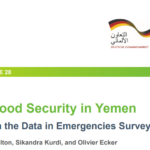Fish is the most frequently consumed animal-source food in Yemen, apart from dairy. Fish consumption is highest in coastal southern Yemen but also very common in southern inland districts. Nine percent of households in coastal southern Yemen earned income from fishing. Earning fishing income is highly positively associated with consumption of fish or meat and with the frequency of fish or meat consumption. Sustaining fish stocks and fishing livelihoods is critical to food security and nutrition in southern Yemen.
Solar Irrigation in Yemen: Promising Impacts Several Months Post Implementation
Technical support component of the intervention was in the form of technical training through agronomists and linking the beneficiaries with other market players such as input suppliers and microfinance institutions. Beneficiaries received technical training on the components and operation of solar-powered water pumps, including the different types available and their respective advantages and disadvantages, and the daily and periodic maintenance required to keep solar-powered pumps functioning optimally
Towards Advancing Children’s Nutritional Intake: Taking Stock of Evidence-based Effective School Feeding Programs in the Middle East and North Africa
The International Food Policy Research Institute (IFPRI) in partnership with the Consultative Group on International Agricultural Research (CGIAR) Fragility, Conflict and Migration (FCM) initiative organized a policy seminar titled “Towards Advancing Children’s Nutritional Intake: Taking Stock of Evidence-based Effective School Feeding Programs in the Middle East and North Africa”. The seminar presented findings from a recent randomized controlled trial, funded by partners from the private sector including HSA Group, and Tetra Pak, on the effectiveness of school feeding programs (SFPs) in emergency and humanitarian contexts.
NEW PUBLICATION: Unlocking the Power of Partnership to Address Yemen’s Food Crisis and Strengthen Food System Resilience
Yemen is experiencing one of the world’s worst humanitarian crises in recent history as a result of the ongoing conflict, which began more than eight years ago. Today, the country faces a food crisis of unprecedented scale. Despite continuing humanitarian aid, about 17 million people — that is, about half the population — are food insecure (WFP 2023), and more than half a million children under the age of five are estimated to suffer from severe acute malnutrition (UNICEF 2023)
Addressing the Food Crisis in Yemen
The Yemen conflict, underway since early 2015, has led to an ongoing, unprecedented humanitarian emergency. Food needs far exceed current consumption levels, with 3.5 million pregnant or breastfeeding women and children under 5 suffering from acute malnutrition and up to 19 million people affected by food insecurity in 2022.
- 1
- 2
- 3
- …
- 7
- Next Page »





